- Home
- Johnny D. Boggs
Mojave Page 8
Mojave Read online
Page 8
The lucky thing, appeared to me, was that on the west side the canyon wall wasn’t more than forty feet high. Ten feet shorter than the east. All I had to do was climb up without getting killed.
A couple of buildings stood next to the canyon wall, but I had to cover about thirty yards with nothing for cover but a few piles of turds and trash.
Then come a sound from Calico proper, and I looked up at the backs of buildings. No longer did I catch the sounds of saws and hammers from the soon-to-be palace of Calico. There were shouts, barking of dogs (or men who thought they was dogs), and even a scream or two. A moment later, I heard it again. Gunfire. Three shots. Four. Five-six-seven-eight. Maybe a few more.
Out loud, I said, “And this town don’t need a jail?”
Then I ran.
Well, I didn’t expect to make it. The way I figured things, Paul With The Winchester was sitting on a chair in the shade in East Calico, maybe smoking some opium, but likely just waiting to find me. Bring up his rifle, jack a round into the chamber, and put me out of my misery.
Didn’t happen. I made it to the first shack. Tried to steady my breathing. Waited. Waited. Waited. Finally, I hopped over to the next building and still wasn’t dead. From the inside of the shack come voices yacking at one another, talking back and forth, man and woman, bitching like husband and wife. Didn’t want them to get hurt by Paul With The Winchester when he started blasting.
The ladder was right there. Ten yards away, forty feet high. I sucked in a deep breath, figured it to be one of my last, and run for the ladder. I got there, turned around, looked up toward the east, didn’t see no assassin, didn’t feel no bullet. Keeping the Spiller & Burr in my right hand, I reached up for the highest rung I could reach.
“You killed Artemis, you peckerwood.”
I sighed. It was over. My hands come down, and I turned and looked up. Paul With The Winchester, at some point, had walked hisself mostly across the bridge. He stood about ten feet from the west side, somehow balancing himself, Winchester’s stock braced against his shoulder, drawing a fine bead right on my middle.
“Actually,” I told him, “Artemis killed hisself.”
“Well, I’ll kill you.”
One eye was closed. The other, the one he was using to sight down on me, just disappeared.
CHAPTER NINE
Never heard the shot. One second I was looking into the eye of the man who was going to kill me, and the next moment there was a hole where that eye had been. Then blood started spurting out of that hole, the Winchester was flipping over the rope rails toward the ground fifty—I mean forty—feet below, and Paul Without The Winchester was staggering over the other end, and he was falling, too.
The Winchester hit first. It bounced a few times. Paul didn’t bounce at all.
I backed away from the ladder a little more, still holding the Spiller & Burr, and a man in black with a rattlesnake coiled over his left shoulder appeared at the bridge. Because the sun was right in my eyes.
“Get out of that cesspool, Micah Bishop,” Whip Watson said. “Those yellow devils aren’t clean.”
I started for the ladder. Whip Watson said, “Get that Winchester.”
This I done, after shoving the .36 in my holster, and then I was up the ladder, and Whip Watson was shucking out the empties from one of his nickel-plated Colts. The .45 casings dropped to the dirt, and Whip was finding fresh loads from his pockets and refilling the chambers. Finished reloading, he looked at me.
“You owe me one,” he said. “Again.”
That was twice he had saved my life. I nodded my appreciation.
“That Winchester working?”
I looked at the barrel, and sent a .44-40 shell that landed on my head and bounced off my newly shorn, freshly washed locks.
“Yeah.”
“Where’s your hat?”
“In a bathhouse across the bridge,” I said. Thinking: With a brand-new hole in it.
“Get it later. Let’s go.”
I pointed at Paul Lying Dead In The Dirt. “He was trying to kill me,” I said. “So was another man. Never seen either one in all my days.”
“Shut up,” he said, like I was stupid. “Let’s go.”
He walked, and I followed, the late Paul’s Winchester in my shaking hands.
Folks crowded the boardwalks of Calico, but the street was practically empty. Except for a dead man lying spread-eagled out in the center of the road in front of the Globe Chop House. Four men in brown suits and brown boots and brown bowlers stood over the body, which was dressed in tan duck pants and a yellow shirt except for the two big patches of red in the belly. One of the men, wearing the nicest bowler and a red tie, stepped over the dead man’s legs. He said, “You’ll answer to this—”
“Later, Slater,” Whip Watson said, and he stepped over the dead man’s legs, too. I done the same, chancing a look-see at the man who had blue eyes that stared straight into the blue sky. Didn’t know him, neither.
A couple stores down was the second dead man—unless you count Pink Shirt and Paul With The Winchester That Was Now Mine, which would make him the fourth. He was propped up against a cracker barrel in front of Slater & McCoy’s business, gripping a Remington in his right hand. He had two holes in his shirt, too, but a bit higher up and spaced closer together than the dead man in the street.
“Where was Guttersnipe Gary going?” Whip Watson asked.
I tried to get enough spit in my mouth to speak. “You told him to get a bath and a—”
“Never mind,” he said, and we made a beeline across the street to where Betty, that dried up ol’ whore, stood in front of the alley that led to her crib, screaming her head off.
She was yelling the same words Lucky Ben Wong had been yelling.
“Murder! Murder! Murder!”
People stood near her, but either they was deaf or they just didn’t give a damn. Not that I could blame them, since two people lay dead on the streets, two more dead in Chinatown, and another man dead right behind Betty’s feet.
Don’t know if I’d seen him before or not, on account that he was facedown in the dirt, with one hole in the small of his back and the back of his head blowed off.
Whip Watson walked right past him. I done the same. Past the privies, we come to Betty’s crib. The front door was open, but outside there was a big copper washtub.
“Damn,” Whip Watson whispered.
He stopped walking.
I said, “Son of a bitch.”
Reckon it happened something like this. Guttersnipe Gary had decided to get his wash and his poke at the same place. I don’t know how much Betty charged for a bath, and I hope I never learn how much she charges for a poke, but I doubt if the combination would have cost Guttersnipe Gary even close to the ten dollars Whip had give him.
So he’d been sitting in the bathtub, scrubbing away, when two men happened down the alley.
He was still in the soapy water that was now fairly dark with blood. His right hand floated on top of that water. His left hand reached all the way to the ground, still gripping one of his revolvers. The two assassins had figured he’d be an easy target in a bathtub, but Guttersnipe Gary was a lot more cautious that even I had thought.
There was a dark hole over his left eye. He had sunk into the tub, so that his head rested against the copper rim, and I figured from how red the soapy water was there’d be two or three more bullet holes somewhere in his belly.
He’d managed to kill one of his killers who had tried to run away only to catch two bullets and fall at the end of the alley. I knowed there had to have been another assassin because even Guttersnipe Gary wasn’t tough enough to kill somebody after catching a bullet in his brain.
“Let’s go.” Whip Watson turned.
I was glad to get out of that alley, even if it brought me right past Betty, who screamed, “Murder!” right in my ear as I passed by.
Sometimes I don’t think too clear, or fast, especially after diving through a wall of empty co
al oil cans, getting some new, expensive duds all dirty, and almost getting shot to death by two hombres I’d never laid eyes on before. But as we turned down Main Street and headed toward the end of town, I understood something.
“Sons of bitches,” I told the back of Whip Watson’s head. “They tried to kill me and Guttersnipe.”
“They didn’t try to kill Guttersnipe Gary,” Whip said. “They did.”
Another bit of genius struck me as I glimpsed the dead man by the cracker barrel and then the dead man surrounded by the brown suits. “They tried to kill you, too?” I asked Whip Watson.
“Tried.”
I was about to ask a damned fool question about why anyone in this town wanted to kill all three of us strangers. But Whip saw something that interested him more, and he yelled, “Boy!”
The waif who’d brung Rogers Canfield to our dinner table was sitting on a box in front of a freight office. He saw Whip Watson with his whip and revolvers and me with Paul With The Winchester’s Winchester, and he leaped from a sitting position, cleared the boardwalk and the hitching rail, and hit the dirt of Main Street running. Boy was angling toward an alley between a saloon and the assayer’s office, and Whip was stepping onto the street, unleashing the blacksnake, then letting it fly.
Almost but not quite I’d forgotten all about Conrad, but the crack of that whip brung images that caused a roiling in my belly which was already in a tenuous state after nigh getting shot to death. My eyes closed, I heard a groan and some gasps and some shouts from the boardwalk, and my eyes opened.
Whip hadn’t struck the boy hard. The leather had wrapped around the kid’s feet, and tripped him up. He was trying to crawl away, but Whip was reeling him in like a trout. One of the women who ran one of the boardinghouses got all indignant at mistreating a child, but none of the menfolk done nothing about it. Even Mr. McCoy and Mr. Slater just stood with two other brown suits by the body of one of six dead men.
The dirty little waif yelled as he got drug. Dust rose in the air. The kid tried to use the palms of his hands as brakes, but Whip was right stronger than a puny little punk.
Eventually, Whip had pulled the kid close enough.
“I’m not going to hurt you, boy,” Whip said, as he loosened the whip around the kid’s ankles. He jerked the blacksnake away, then fished a coin from his pocket. It was just a Morgan dollar, not gold or nothing, and the kid, by my way of thinking, was already rich.
“Rogers Canfield,” Whip said. “You found him.”
“Ye-s-s-s . . . s-s-s-ir.”
“Where?”
“In . . . his-s-s . . . off-ice.”
“Which is where?”
The kid rolled over, got to his dirty knees, and pointed a dirty finger at one of the few two-story buildings in town.
“C-c-c-corner,” he said.
A sign on the whitewashed frame structure said BANK, but lots of banks rented rooms in the top floor to various businesses. Provided the banker some income in case the bank went bust.
The dollar dropped in the dirt, and Whip was coiling his whip as he crossed the street. I didn’t need him to tell me to come along. I came along.
Up the outer staircase we went, because walking into a bank with a man in black with a whip and me carrying a dead man’s Winchester repeater seems like a good way to get killed as bank robbers. Upstairs, I opened the door, and Whip walked in, stopped. I come in right behind him, and we stared down a long hall.
The inside staircase came up in the center. Four doors on each side of the hallway. I looked down, made sure the Winchester was cocked. Whip kept the whip in both hands, and we walked toward the muffled voices coming from inside the street-corner office, past an attorney’s office on the left . . . a mining headquarters on the right . . . a bookseller on the left . . . and the door opened on the right.
“If I were you,” Whip Watson told the dressmaker, “I’d get back to stitching.”
“And keep your head down,” I advised as the door slammed in my face.
We passed the stairs. Didn’t look down at any business going on in the bank. Passed a land office on the left, and a office for rent on the right.
Then we stood in at the end of the hallway, with a haberdashery on the right, and on the left, the corner office, where those voices were coming from.
“Where’s Paul, damn it?” came a voice I recognized as belonging to Rogers Canfield/Ronen Kanievsky the shadchan/matchmaker.
I mouthed an answer: He’s dead.
“Damn it,” Canfield went on. “Paul and Gates . . . Patton . . . Dirty Lou . . . they should all be here by now. Damn it. Damn it. Damn it. This better have gone down the way it was supposed to have.”
“The way it was supposed to have gone down,” another voice said, “wasn’t with Bernie gettin’ his brains blowed out.”
Canfield squealed and cussed, and Whip Watson put his hand on the knob to the office. I read the sign on the door.
R O G E R S C A N F I E L D
MATRIMONIAL AGENT
MARRIAGE BROKER
And below that in real fancy script:
I Deal in Wedded Bliss
The second voice said. “I did my job, Canfield. Just give me what I got comin’.”
That’s when Whip Watson pushed open the door, making me realize that Canfield was an idiot, or maybe too damned confident, because he hadn’t locked the door.
Whip went in first, and I followed him, having to duck as that whip sailed slightly over my head.
What I saw was Rogers Canfield standing and sweating in front of a rolltop desk. I saw the butt of a small pistol lying on some papers on that desk. A big Bible. I saw a bunch of parchments framed hanging on the wall. A painting of Jesus. Next to a painting of Cupid. Lots of mail piled up in a chair. Saw Canfield reaching for the pistol, choking out a scream. Then I turned to the second man.
Big cuss, with no front teeth, reaching a gloved hand for a Remington .44 stuck in a mule-ear pocket. He wore a brown slouch hat and a buckskin shirt. The gun had cleared his pocket, and Whip’s whip had snapped, and Canfield was screaming and Whip was cussing, and No Front Teeth was thumbing back the Remington’s revolver.
Then I saw a bunch of white smoke, and felt my eyes stinging and heard my ears ringing and smelled burned powder. I stepped to the side, jacking another shell into the rifle I’d just fired, and shot again. But I didn’t have to. No Front Teeth wasn’t there no more. There was a bunch of broken glass and the curtain rod had been pulled down. The curtains was gone. Just like No Front Teeth.
Turning, I saw Whip Watson coiling his whip. The little pistol lay where it had been atop the desk. Rogers Canfield lay on the floor, gripping his throat and gagging. Whip was leaning, jerking the matrimonial agent to his feet, and shoving him into the chair that wasn’t full of mail.
I moved to the window and looked down. No Front Teeth lay atop a water trough, legs bent on one side of the trough, head hanging on the other, one arm resting on the ground, the other floating atop the water, a big, bloody hole in the center of his buckskin shirt. The curtains lay in the street. Good thing no horses had been slaking their thirsts, I thought, and shrugged at the brown suits staring up at me.
A lot of screaming and shouting was going on outside, now that the ringing wasn’t so loud in my ears.
I turned, watched Whip Watson slap Rogers Canfield’s face.
“This how you pay your partner, partner?” Whip asked. Then slapped Canfield’s left cheek.
“I—”
Whip slapped Canfield’s right cheek.
“We had a deal.”
“Yes . . . but . . .”
Another slap.
“So you’re double-dealing.”
“No . . . Whip . . .”
Slap.
“You wouldn’t kill me . . . not without somebody else backing your play.” Slap. “And I don’t mean those five idiots you sent to kill us.” Slap. “They’re dead.”
“Six,” I said, now that No Front Teeth had de
parted this world.
Either Whip didn’t hear me or didn’t care. He was too busy slapping Rogers Canfield.
“Who’s behind this?” Whip asked. “Who wants me dead? Besides you? Who wants my merchandise?”
“I . . .”
Slapped again.
Whip Watson backed away from the blubbering Canfield, picking up his blacksnake whip.
“One way or the other,” Whip told the marriage man, “you’ll talk. How’s it gonna be?”
“You’ll kill me anyway.” Rogers Canfield sobbed.
“Maybe, but this way”—he gestured with the blacksnake—“you won’t have any skin left on you. Ain’t that right, Micah Bishop?”
The Winchester felt heavy in my hands. I swallowed down more bile and said, “Better tell him.”
“You won’t kill me?” Rogers Canfield begged.
Whip cracked the whip, just a little.
Canfield slid back in his chair, raising his hands over his face. “All right!” He wet his britches. “Please. It wasn’t my idea.”
“Never figured it was. You deal in wedded bliss, not assassinations.”
I didn’t know nothing about what they was talking about, but I did know that Rogers Canfield had tried to get me killed. So I didn’t care much for him. I moved away from the window, away from Whip’s whip, and stepped into the open doorway. I looked down the hallway, half expecting the law to come racing up those stairs, but then I recollected that Calico had no law. No jail. Just seven dead men.
I tried to recollect where the undertaker’s office was in this town. He’d have a right prosperous day.
“Who?” Whip Watson’s voice jerked my attention back into the marriage broker’s office.
“But . . .”
“Who?”
“I can’t . . .” The whip cut a slice off Rogers Canfield’s left knee. Wailing like banshees are always wailing, he gripped his knee and said, “All right! All right. It was her idea.”
Her? That caused me to straighten. It caused Whip to even step back a couple paces as he gathered up the blacksnake.

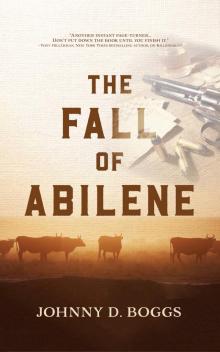 The Fall of Abilene
The Fall of Abilene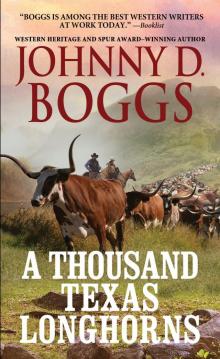 A Thousand Texas Longhorns
A Thousand Texas Longhorns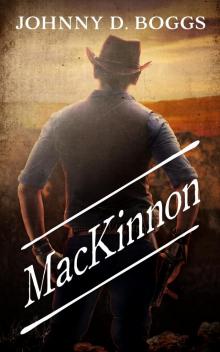 MacKinnon
MacKinnon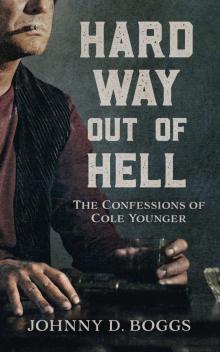 Hard Way Out of Hell
Hard Way Out of Hell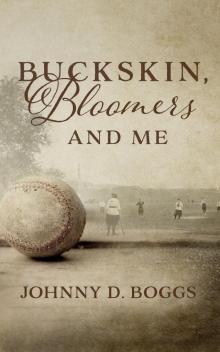 Buckskin, Bloomers, and Me
Buckskin, Bloomers, and Me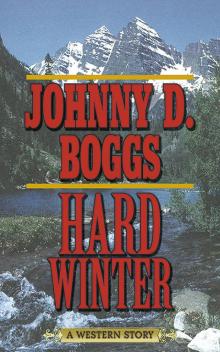 Hard Winter
Hard Winter Wreaths of Glory
Wreaths of Glory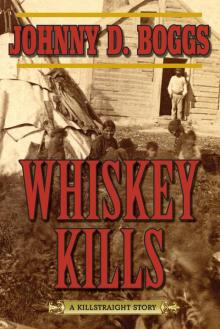 Whiskey Kills
Whiskey Kills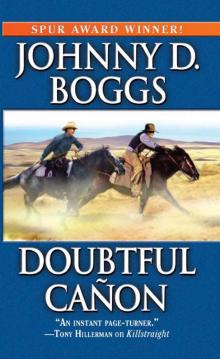 Doubtful Canon
Doubtful Canon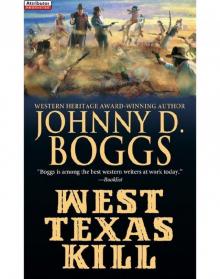 West Texas Kill
West Texas Kill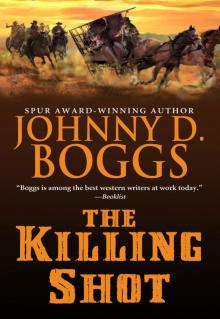 The Killing Shot
The Killing Shot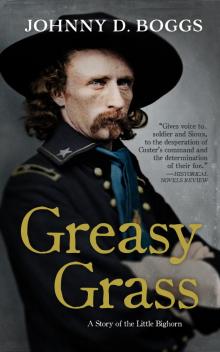 Greasy Grass
Greasy Grass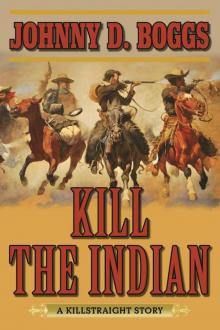 Kill the Indian
Kill the Indian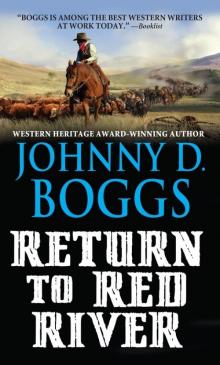 Return to Red River
Return to Red River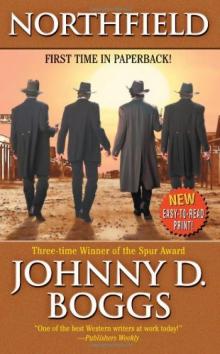 Northfield
Northfield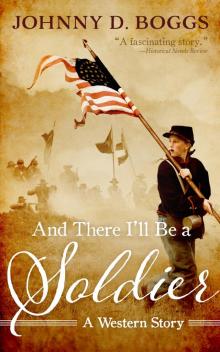 And There I’ll Be a Soldier
And There I’ll Be a Soldier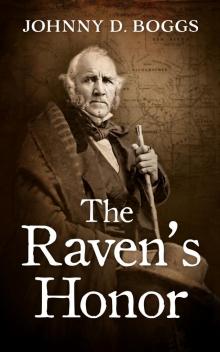 The Raven's Honor
The Raven's Honor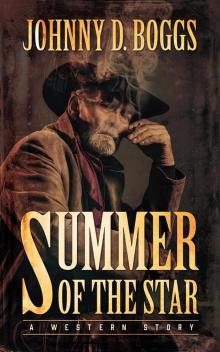 Summer of the Star
Summer of the Star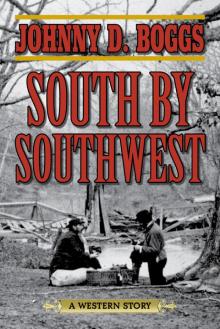 South by Southwest
South by Southwest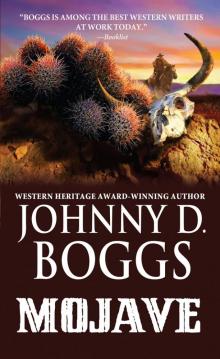 Mojave
Mojave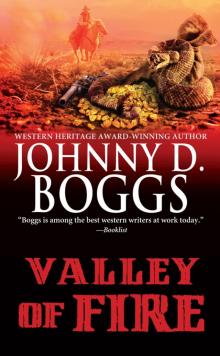 Valley of Fire
Valley of Fire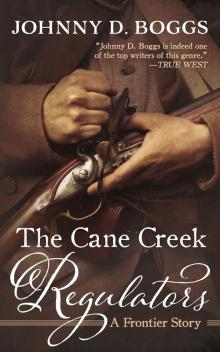 The Cane Creek Regulators
The Cane Creek Regulators